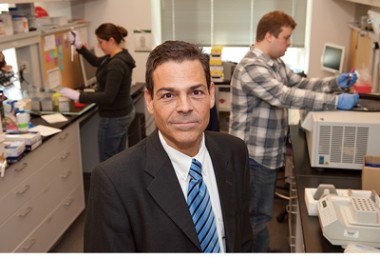An alternative to colonoscopy

“We could save a lot of lives,” says Xavier Llor, associate professor of medicine. Photo: Roberta Dupuis-Devlin/UIC Photo Services
Through its Proof of Concept Gap Funding Initiative, UIC’s Office of Technology Management provides awards of up to $75,000 to UIC researchers who have technology disclosures on file with the university. Four research projects received funding in July and more projects will receive funding this fall.
Too many people refuse screenings for colorectal cancer because the tests are uncomfortable and costly, says Xavier Llor.
Llor and his research team are developing a simple, inexpensive blood test that can screen for colorectal cancer, the third most common cause of cancer-related death in the U.S.
Colorectal cancer is often curable if detected early, Llor said.
“The population is very used to screenings through blood tests and we don’t have a blood test right now to screen for colorectal cancer,” said Llor, associate professor of medicine.
“We want to increase acceptance of screenings, decrease aggressive procedures and decrease death.”
Colonoscopy procedures — the most common screening for colorectal cancer — are uncomfortable, invasive and carry a risk of complications, Llor said.
“You want a screening procedure to be noninvasive and accepted by most people,” he said.
Llor’s blood test detects a combination of circulating microRNA levels in plasma that could indicate the presence of colorectal cancer. Preliminary studies have shown success, he said.
Llor’s team, which includes postdoctoral research associate Rosa Xicola, is gathering data on microRNAs to pinpoint the most simple, yet effective, panel of microRNAs to study.
“We want to look at patients with other types of cancer to see if these microRNA panels are specifically for colorectal cancer, or do they detect other types of cancer, too?” he said.
“We could save a lot of lives.”
